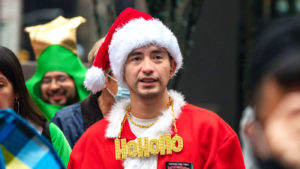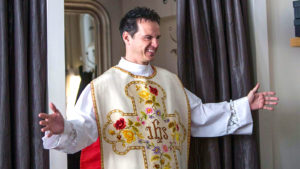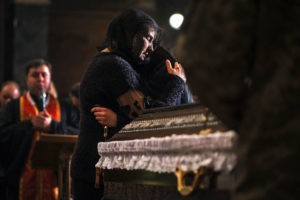I will be baptising four new Christians on Easter morning: two adults, two children. One of the adults asked me about their baptism preparation last week. Traditionally, that is what Lent is for — a period of fasting and reflection before the big day. But he was looking for something else, not altogether specified.
I asked him to imagine he was standing on the edge of a swimming pool. Then I gave him a push in the small of his back. He stumbled forward. The leap of faith often requires a little shove. Yes, there are books to read, courses to attend, things to think about. But like learning to swim, there is only so much you can do from dry ground.
And like learning to swim, faith also involves the prospect of drowning. Baptism isn’t a little bit of genteel water sprinkling. The imagery is one of death and rebirth. It’s a simulated drowning. The old person is destroyed; the new one rises from the waters. Like Neo being unplugged from the Matrix and being reborn into a new reality. Evangelicals are not wrong when they speak of being born again. You can’t fully plan for what that involves. At some level, you just have to take the plunge.
I have been the priest at St Mary, Newington for ten years. This Sunday, I am moving on. A new parish awaits. The skip is full of stuff I remember buying with much excitement, but now looks like pointless trash; the salvation promised by advertising and the shopping centre is so short-lived. And now the removal vans have been — and trashed more of our apparently precious belongings — there are further trips to the local tip, which is rather poignantly located next to the crematorium.
This is where things come when they have stopped working: our fridges and our bodies. The tip and the crem are Good Friday places. This is the wasteland, the valley of the shadow of death. Perhaps one day we should gather here, rather than in a lovely church, to experience the full existential desolation of the crucifixion. Golgotha, the site of the crucifixion, was itself a rubbish dump. A place of human landfill. This is where our dreams come to die.
I have never been especially threatened by atheism. For one thing, atheism is good for business: it helps maintain the tension. Indifference is the real enemy. But also because atheism is assigned a pivotal place in the Christian narrative. The period between 3pm on Friday and dawn on Sunday symbolises my own atheistic imaginings. When He is murdered by the Romans, all the expectation and excitement of Jesus-following is shown up as a terrible, embarrassing mistake. We were conned. He wasn’t the new King after all. Might is right. Oh, I get atheism all right. It’s an essential part of the cycle of Holy Week.
But professional atheists reading this will be sceptical of my identification with their cause. There is a “but” coming. A sleight of hand. As Alice Roberts snarkily told her Twitter followers last Good Friday: “Just a little reminder today. Dead people — don’t come back to life.”
They don’t, of course. But even nature itself sings a very different kind of song. A wander around Kew Gardens, right next to my new church, reveals the natural world coming back to glorious life after the dead of winter. It’s a wholly natural expression of deep Christian instinct: that there is life beyond death. That even death cannot keep life down.
The resurrection of Jesus is not magic. Not “a conjuring trick with bones”, as the great Bishop David Jenkins once put it. It’s an acknowledgement that a life rooted in the eternal will not remain under the heel of perpetual nothingness. Agreed, this is not an empirical statement. I have stepped outside what can be demonstrated naturally. The God I describe is beyond time and space, the author of all things, not one thing among others.
“Blah,” go the atheists. But upon this “blah” I hang my whole life. The God who is there in the person of Jesus is the same one in whom everything moves and has their being. It’s not that physical death doesn’t happen. It’s just that it doesn’t mean what nihilists believe it means. Hope exists because God exists.
As I leave my old parish, I feel a terrible sense of abandoning my people. It was hard to start with. Ten years ago, I was parachuted in by the Bishop who took pity on me after my resignation from St Paul’s Cathedral. Like all parishes, they wanted St Francis of Assisi with an MBA. What they got was a broken spirit, in hiding from the world. And to start with, many of them didn’t much care for what they got.
I don’t blame them really. I was a mess. Some of them left the church. But slowly we rebuilt and we bonded. Now they are my family, the water of baptism being thicker than the blood of biological relatedness. We have been through everything together: bereavements, deep disappointments, some of the happiest parties you can ever imagine, then the emotional desolation of lockdown. During my ten years here, some of the post-war estates have been demolished and new more expensive and private developments have taken their place. As gentrification spread, our congregation has become much younger and whiter.
Last week, I buried Mr Jones, a man of great dignity and wisdom. Originally from Accra in Ghana, he worked as a civil servant in international development. He lay in church in an open casket, in a grey suit and a white bow tie. He loved his family and would read the Bible every day. He was old-school, the “Jesus loves me this I know” kind of Christian. The church was packed. The service was “done properly”. We sang ‘Abide with Me’: “Change and decay in all around I see, O thou who changest not abide with me.”
Our new church intake looks very different. Apart from being younger and whiter, they were not raised in the faith. There were fewer infant baptisms for this generation. Here, faith is a choice not an inheritance. “I wish my parents had done this for me,” said one of the new baptismal candidates. I understand this. Becoming a Christian is much harder to do as an act of choice, more fraught with anxiety.
The generation raised under the aegis of liberalism have to bear the weight of their own choices. This is problematic because to be in a church is to be a part of a family. The idea that you choose your family, choose to be baptised, seems to introduce a strange contractual aspect to this relationship, like taking out a mobile phone contract. I wonder if those “wanting more” in baptism preparation are, on some level, asking me for the small print. Is that how they see the Bible, I wonder? I hope I have helped to disabuse them of this idea.
My old friend Lord Sacks, of blessed memory, made much of this. The Bible speaks of God being bound to His people through covenant not contract. Unlike the contract, the Biblical covenant is a promise — love and be loved, through thick and thin, good times and bad. Even death cannot destroy this love. God is not a service provider in the liberal economy. The Holy Spirit cannot be summoned on Getir.
More is the pity, some might say. I don’t have answers to many of the problems that people bring into this church. I can’t solve the deep poverty that many experience, nor the broken relationships, nor the desperate sense that the world is not responsive to everyone’s deepest needs. I am there to carry them, and they carry me. The church is where you can bring all the stuff that is impossible to solve. And there are advantages to this — it means that we are not frightened of all the stuff that cannot be remedied. We can carry failure. And we can only do this because, as I said before, hope exists because God exists.
When I celebrate Mass here for the final time, I need to remind myself that I am not abandoning people, because it’s not all about me. The only real job of a priest is to point beyond him or herself to that God who, I believe, is the only true ground of lasting hope. In a funny way, I suspect my departure has helped focus that for some of the congregation. Like a small shove in the back.
On Easter Sunday, as dawn breaks over South London, I will light a fire in the crumbling remains of my old church, substantially redesigned by the Luftwaffe, yet unbowed. I will take that fire into church and the first of the day’s baptisms will begin. Clouds of incense will pick up the light now streaming in through the window. The fire will be shared as everyone’s candles are lit. I will cry. Hugs will be shared. The victory over death will be proclaimed.
Later, we will feast on Jollof rice, which is a kind of sacrament of community round these parts. That seems a perfect way to say goodbye. We will always be family. Water is thicker than blood.
Disclaimer
Some of the posts we share are controversial and we do not necessarily agree with them in the whole extend. Sometimes we agree with the content or part of it but we do not agree with the narration or language. Nevertheless we find them somehow interesting, valuable and/or informative or we share them, because we strongly believe in freedom of speech, free press and journalism. We strongly encourage you to have a critical approach to all the content, do your own research and analysis to build your own opinion.
We would be glad to have your feedback.
Source: UnHerd Read the original article here: https://unherd.com




